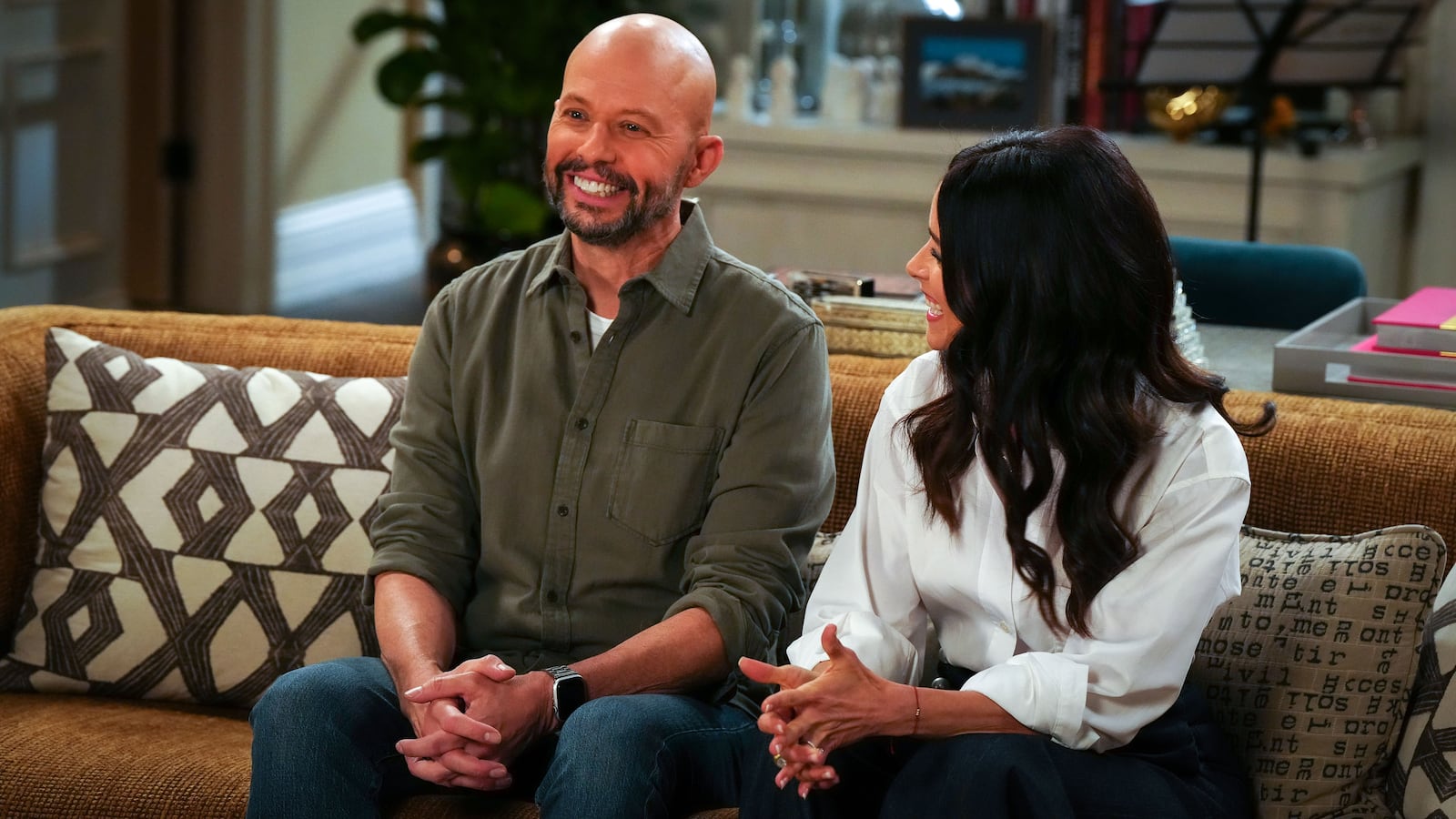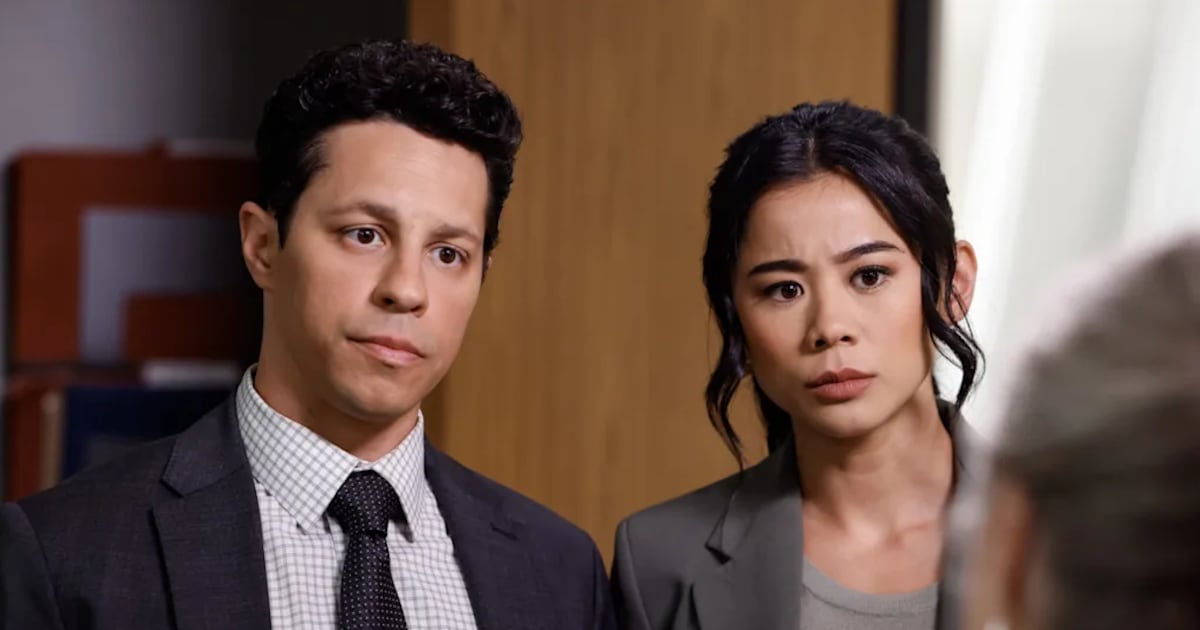Jon Cryer’s TV-star superpower is his willingness to keep at it. He weathered a litany of one-season shows in the ’90s before landing his signature part on Two and a Half Men, where he happily played second fiddle (or at least, less-famous fiddle) to his co-star Charlie Sheen, and then remained the show’s steadying presence for the balance of its run after Sheen’s rancorous exit, winning some Emmys for his trouble. Now Cryer is game for an attempt at an old-fashioned multi-camera sitcom revival that tries to incorporate some new-fangled (which is to say, two decade-old) techniques. Extended Family is the kind of project that desperately needs its stars to power through and attempt to drown out its creakiness.
At first, it looks a little like the opposite—like Extended Family will usher some established TV performers into a cutely progressive look at contemporary blended families. Jim Kearney (Jon Cryer) and Julia Mariano (Abigail Spencer) are already divorced when the pilot begins, co-parenting their children Grace (Sofia Capanna) and Jimmy Jr. (Finn Sweeney) by rotating in and out of the family home—nicknamed “the nest”—at one-week intervals.
This arrangement is complicated but not torpedoed by Julia’s new engagement to Trey (Scrubs star Donald Faison), the owner of the Boston Celtics, who looks slightly askance at the ex-couple’s arrangement. For the most part, creator Mike O’Malley (a familiar sitcom face himself from years of Yes Dear) isn’t trying to pump the characters full of resentful, bad-sitcom venom. The show seems genuinely interested in normalizing healthy post-divorce relationships, focusing on quirks of the situation rather than potential nastiness. It’s like the characters are in some kind of… modern family?
Actually, it’s a lot like that, considering that Extended Family includes regular cutaways where characters address the camera, as if attempting to bring the single-camera, no-studio-audience techniques of The Office or, yes, Modern Family to the multicam masses. In doing so, the show feels oblivious of something. It’s either under the mistaken assumption that Modern Family’s popularity was due to audiences stringently demanding inexplicable interview segments on their sitcoms, or it’s unaware that Modern Family was already the most popular sitcom on network TV for many years and therefore doesn’t really require translation to a broader audience.

Or maybe Extended Family is really just inserting these segments for stylistic experimentation. If so, it doesn’t pay off. The pilot is the busiest in this department, with many direct-address scenes and flashbacks filling in the details of Jim and Julia’s arrangement with unnecessary elaborations. (A whole scene of Jim and Julia performing a divorce “ceremony” complete with vow-discarding and a DJ is more smug than irreverent.) The other two episodes provided for review settle down a bit—and wind up feeling weirdly bare-bones, reminding viewers what a deep bench the most beloved single-camera sitcoms tend to have. Absent that, Extended Family gives multiple long scenes over to Cryer to belabor some easy-to-grasp comic idea (such as his dedication to a post-divorce family “constitution”) and then hammer its jokes deep into the ground.
There’s something theoretically appealing about zeroing in on a smaller, more specific family, rather than burying these circumstances within a larger ensemble. But if O’Malley avoids the worst sitcom clichés about bitterly feuding exes, he doesn’t exactly land on a comfort-watch, either. Extended Family is supposed to derive its comedy from the conflict between a friendly, open approach to a new family dynamic, and the complicated (and sometimes less-than-sunny) feelings that inevitably emerge anyway. Instead, the characters—especially Jim—often come across as unpleasantly fussy and passive-aggressive.
Take, for example, a runner in one episode about Jim’s exhaustion after solo parenting for two weeks that makes it sound as if he’s chasing around two toddlers rather than watching over two older kids who, by the show’s own characterization, spend a lot of time by themselves on their phones anyway. There are first-level hacky jokes (these kids and their phones!) without exploiting second-level ironies (parents benefit from distraction devices too). Similarly, a plotline about Jim kvetching over Trey staying over at “the nest” before he and Julia are technically married (it violates that house constitution, not Jim’s personal hang-ups, he swears) stalls out at discomfort, never really making any sharp observations or landing any great jokes.
Extended Family has its comedy-pro moments, like one episode’s running gag about Jim and Trey’s shared affinity for “Swedish murder shows,” well-played by Cryer and Faison. The central trio does what sitcom stars are supposed to do, following Cryer’s lead and keeping to the family-comedy task at hand. Too often, though, it’s the show that appears to be powering through—enduring the potentially interesting or offbeat stuff so that it can get back to its creaky familiarity.






